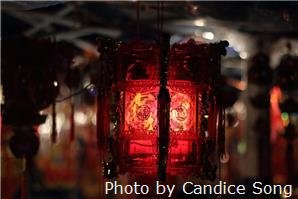漢語拼音: iang iao ian
Category Archives: 舊部落格文章
元宵節Festival of Lanterns
元宵節Festival of Lanterns
Information from http://www.chinahighlights.com/festivals/lantern-festival.htm
Lantern Festival is celebrated on the 15th day of the first month of traditional Chinese calendar.
As the first important festival after the traditional Chinese New Year
(Spring Festival), it is also the first night to see a full moon, and
it marks the end of the two-week New Year holiday period. During Lantern
Festival, people get together to celebrate the beginning of spring by
watching lanterns, fireworks and eating Yuanxiao (sweet stuffed
dumplings made of glutinous rice flour served in soup).
Legend about the Lantern
Legend
has it that long time ago, there were many fierce wild beasts and birds
that greatly affected local people's lives and safety. In order to
protect themselves, people had to kill those wild animals. One day, a
sacred bird in heaven accidentally got lost and fell on the mortal
world. However, an ignorant hunter thought the bird was kind of fierce
animal and killed it. The heaven emperor was very angry and ordered his
soldiers to set fire and burn everything on the fifteenth day of the
first month. The daughter of heaven emperor was very kind and did not
want it to happen. So she secretly came to the mortal world and informed
the people. People were scared and tried to think of a solution. An old
man came up with an idea. He told every family should light up lanterns
and fireworks on the 14th, 15th and 16th day of the 1st lunar month.
Maybe the heaven emperor would think that everything has been burned
out. Everyone
agreed and was busy preparing for that. On the 15th day of the 1st
lunar month, the heaven emperor looked down, and there was red fire and
thundering cracks everywhere, for three nights. He thought the folks had
been punished; therefore people got to keep their lives and property.
From then on, people light up lanterns and fireworks on the 15th day of the 1st lunar month, in order to celebrate the success.
The origin of Festival of Lanterns
Customs
China
is a vast country with a long history and diverse cultures, so the
customs and activities vary in different areas. Among them, eating
Yuanxiao, watch lanterns, guess lantern riddles, lion dance and dragon
dance are the most important and prevalent ones. Hangzhou,
the political center of the Southern Song Dynasty), witnessed the
flourish of making and guessing lantern riddles during people's
appreciation of lanterns. People wrote riddles on paper notes and pasted
upon the colorful lanterns. If visitors think they have the right
answers to the riddles, they could pull the paper out and went to the
lantern owners to check their answer. If they were right, they would get
small gifts. As riddle guessing is interesting and informative, it has
become popular among all social strata.
Guessing the Lantern Riddles

the lantern riddles, also known as playing lantern riddles, is one of
the most important and popular activities of the Lantern Festival. The
lantern riddles, originating from common riddles, emerged in the
Southern Song Dynasty (960-1279), whose capital, Lin'an (today's
Hangzhou, the political center of the Southern Song Dynasty), witnessed
the flourish of making and guessing lantern riddles during people's
appreciation of lanterns. People wrote riddles on paper notes and pasted
upon the colorful lanterns. If visitors think they have the right
answers to the riddles, they could pull the paper out and went to the
lantern owners to check their answer. If they were right, they would get
small gifts. As riddle guessing is interesting and informative, it has
become popular among all social strata.
湯圓 v.s. 元宵
Quizlet:第十三課詞語練習 Lesson 13 Phrase Practice
第十三課認字作業 Lesson 13 Text Audio
第十三課認字作業 Lesson 13 Text Audio
Listen to lesson 13’s audio and read the
following text without pinyin.
念一念(一):小嘴巴
240824-Reading 1 little Mouth.mp3
小嘴巴, 小嘴巴,
哭一哭,像喇叭,
笑一笑,像朵花兒。
小嘴巴, 小嘴巴,
叫一叫,像小鴨,
唱一唱,像青蛙。
念一念(二):鏡子
我看你,你也看我。
我笑你也笑,
我哭你也哭,
我走了,你也不見了。
Cantonese Recording:
漢語拼音Han Hu Pin Yin: ing in ie ia
漢語拼音Han Hu Pin Yin: ing in ie ia
中國新年Chinese New Year
學生錄音作業分享Student Recording Homework
學生錄音作業分享Student Recording Homework
題目: 用"正在"造三個句子
蕭慧云
丁紀華
第十二課認字作業 Lesson 12
第十二課認字作業(Word
recognition homework)
Read the
following words without pinyin.
240822-Reading 1 Puppy and Chick.mp3
念一念(一):小狗和小雞
小狗和小雞在雪地上走。
小雞說:「你看,你看,我會畫竹葉。」
小狗說:「你看,你看,我會畫梅花。」
240823-Reading 2 where did the snowman go.mp3
念一念(二):雪人怎麼不見了
雪人怎麼不見了?
雪人怎麼不見了?
雪人只有手呀沒有腳呀,
他呀他呀不會自己跑。
雪人只怕太陽照,
太陽一出雪就消,
雪人不會喊呀不會叫呀,
太陽出來他就融化掉。
Cantanese Recording: B1_A012.mp3
Normal
0
0
2
false
false
false
EN-US
ZH-TW
X-NONE
MicrosoftInternetExplorer4
